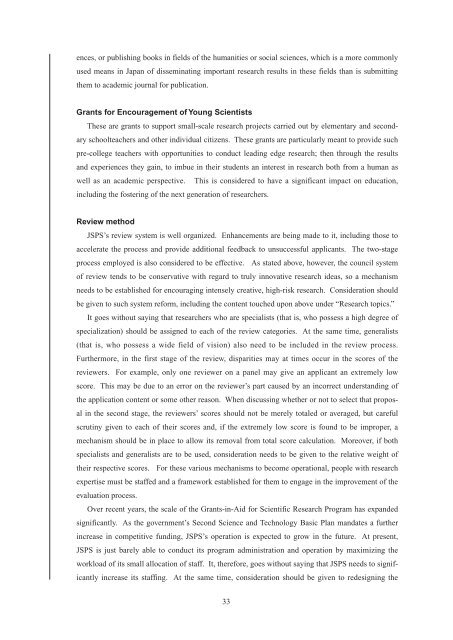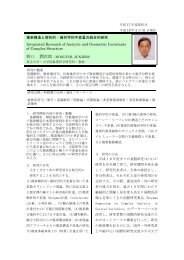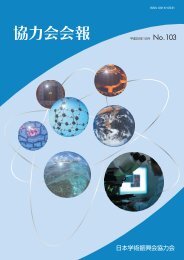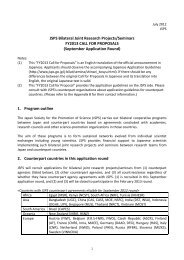"JSPS External Review Report" was issued.(PDF File 1.22MB)
"JSPS External Review Report" was issued.(PDF File 1.22MB)
"JSPS External Review Report" was issued.(PDF File 1.22MB)
You also want an ePaper? Increase the reach of your titles
YUMPU automatically turns print PDFs into web optimized ePapers that Google loves.
ences, or publishing books in fields of the humanities or social sciences, which is a more commonlyused means in Japan of disseminating important research results in these fields than is submittingthem to academic journal for publication.Grants for Encouragement of Young ScientistsThese are grants to support small-scale research projects carried out by elementary and secondaryschoolteachers and other individual citizens. These grants are particularly meant to provide suchpre-college teachers with opportunities to conduct leading edge research; then through the resultsand experiences they gain, to imbue in their students an interest in research both from a human aswell as an academic perspective. This is considered to have a significant impact on education,including the fostering of the next generation of researchers.<strong>Review</strong> method<strong>JSPS</strong>’s review system is well organized. Enhancements are being made to it, including those toaccelerate the process and provide additional feedback to unsuccessful applicants. The two-stageprocess employed is also considered to be effective. As stated above, however, the council systemof review tends to be conservative with regard to truly innovative research ideas, so a mechanismneeds to be established for encouraging intensely creative, high-risk research. Consideration shouldbe given to such system reform, including the content touched upon above under “Research topics.”It goes without saying that researchers who are specialists (that is, who possess a high degree ofspecialization) should be assigned to each of the review categories. At the same time, generalists(that is, who possess a wide field of vision) also need to be included in the review process.Furthermore, in the first stage of the review, disparities may at times occur in the scores of thereviewers. For example, only one reviewer on a panel may give an applicant an extremely lowscore. This may be due to an error on the reviewer’s part caused by an incorrect understanding ofthe application content or some other reason. When discussing whether or not to select that proposalin the second stage, the reviewers’ scores should not be merely totaled or averaged, but carefulscrutiny given to each of their scores and, if the extremely low score is found to be improper, amechanism should be in place to allow its removal from total score calculation. Moreover, if bothspecialists and generalists are to be used, consideration needs to be given to the relative weight oftheir respective scores. For these various mechanisms to become operational, people with researchexpertise must be staffed and a framework established for them to engage in the improvement of theevaluation process.Over recent years, the scale of the Grants-in-Aid for Scientific Research Program has expandedsignificantly. As the government’s Second Science and Technology Basic Plan mandates a furtherincrease in competitive funding, <strong>JSPS</strong>’s operation is expected to grow in the future. At present,<strong>JSPS</strong> is just barely able to conduct its program administration and operation by maximizing theworkload of its small allocation of staff. It, therefore, goes without saying that <strong>JSPS</strong> needs to significantlyincrease its staffing. At the same time, consideration should be given to redesigning the33







